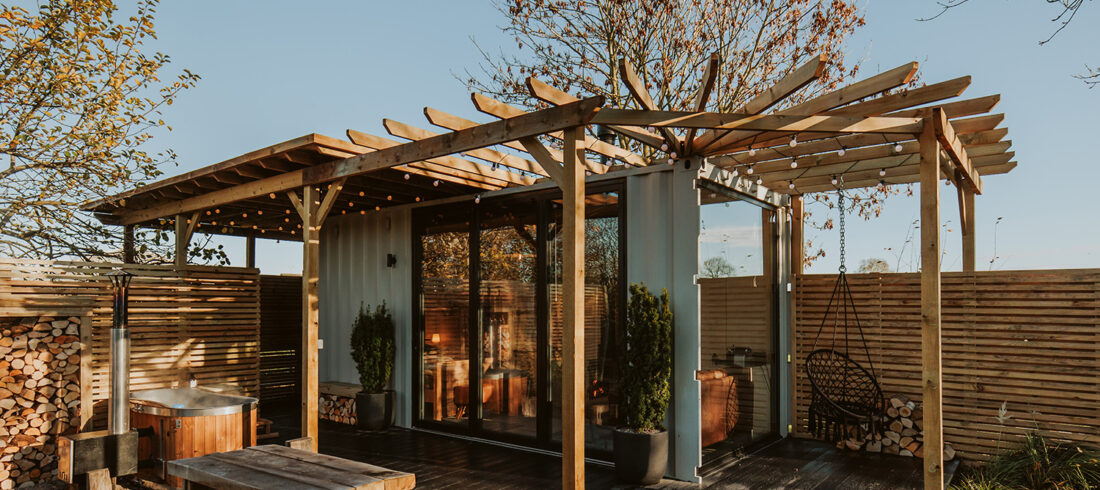Shipping containers made out of durable corrugated steel, normally used to exclusively transport goods around the world on cargo ships are perfectly built to withstand the most extreme conditions on the planet.
This inbuilt strength means that they can be used as an ideal alternative building solution. Shipping containers take less time to construct, can cost less money, and be much less stressful than a traditional brick and mortar building.
But do they follow the same rules? Does a shipping container need planning permission? Well it’s more complicated than a simple yes and no.
Each situation can have different rules and roadblocks around it. We take a look at all the different scenarios where you may or may not need planning permission for your shipping container property.
When Would I Need Planning Permission?
A shipping container is generally classed as a temporary structure, meaning that it’s not intended for full use the same way a traditional property is. The flexibility of shipping containers does mean that using one for more permanent use would be possible, so how you plan on using your container might affect if you need planning permission or not.
While a shipping container being considered as a temporary structure may be good, it would be wrong for us to say that temporary structures never need planning permission. For the most part you can get away without it, but not always.
Live Off Grid’s shipping container homes are built to be perfect for getting off the beaten track and living life your way, should it take your fancy.
So should you wish to get away and permanently move into a shipping container it is possible that the council may require planning permission.
Similarly, if the land you want to put your container on covers more than half of the area surrounding the original property, you may need the local authorities to give you the green light first.
Another case where you could need planning permission is if you purchase a container to be converted into a shipping container restaurant or cafe. This is dependent on the specifics of the business and its location.
Should your business remain in one place for over 28 days it would no longer be considered a temporary structure and would likely need some form of planning permission. Businesses that move around on a
consistent basis such as event catering or pop-ups would likely be able to go without planning permission without issue.
The specific rules for each planning permission case can differ across county borders throughout the United Kingdom. It’s always best to double-check with your local planning authority for a concrete answer before you place a shipping container order.
Other Factors to Consider
When preparing to purchase and install a shipping container structure to your land, or any other form of development, there are always a number of different factors to consider.
One of the main factors that could cause you to need planning permission regardless of what you’re installing is the location.
If you’re lucky enough to live in an area of outstanding natural beauty, in or near a listed building, or on national park land the guidelines would in most cases be significantly stricter to adequately protect the area.
Similarly, if the installation of your structure could cause a significant loss of light or privacy for your neighbours, impede access, or cause additional traffic/noise pollution to the local area, planning permission may be required. In many of these cases, it could be denied.
Additionally, the larger the structure the more likely you’ll need to apply for planning permission. Any structure taller than the nearby property would require the local authority’s approval, and structures that have permanent utilities such as electricity and water plug-ins are also more likely to need permission.
The Caravan Act 1968
It might be a touch confusing to see an act named after caravans from specialists in shipping containers. But the Caravan Act of 1968 doesn’t refer specifically to caravans, instead detailing the rules behind the broader class of temporary accommodation and mobile homes.
As defined by the Caravan Act, a mobile home is a structure designed for a person to live in that can be freely moved around if needed. A structure that is connected to the ground and is not able to be moved would be classed as a permanent structure, and therefore be ineligible for any of the acts benefits.
According to the Caravan Act 1968 (amended in England 2006) the definition of a mobile home is:
- A structure, not classing as a building
- Fit for human habitation
- Free and capable of being moved from place to place after assembly
- Less than 20M x 3.05M
The importance of the Caravan Act and achieving a mobile home status is that mobile homes benefit from relaxed planning permission restrictions.
With the Caravan Act, should you want to place a shipping container on your property that fits within the rules stated you could avoid weeks of hassle and paperwork, as opposed to if you were putting up a brick and mortar structure.
Does a Shipping Container Need Planning Permission?
Long story short, it depends on the situation. From a shipping container office, to a shipping container house, if it’s not taking up too much room on your land, isn’t affecting neighbours or surrounding infrastructure, and it’s portable, then you probably won’t need planning permission.
But we implore you to not just take our word for it. Don’t assume that because a shipping container is classed as a temporary structure that you’ll be good to go no matter what. Each situation is unique so it’s always safer to double check what you’ll be allowed to do in your area, your bank account will thank you.
Always double check. Double check if your shipping container will fall under The Caravan Act, double check if the council will require planning permission, if your area is unsuitable etc.
When it comes to your money and your property ask questions first and shoot later, it’s the safest option.
For more information on converted shipping containers and if shipping containers need planning permission please feel free to contact us, we will try to help however we can.









